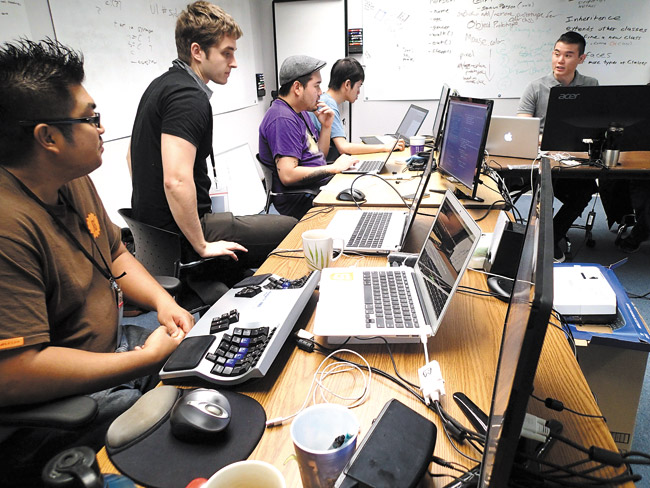Helping To Solve The Tech ‘Brain Drain’
Running a tech startup, Russel Cheng and Jason Sewell often had trouble finding Web developers to work with. They were up against the brain drain – talented software developers were leaving the Islands in pursuit of technical jobs that tend to be more plentiful elsewhere.
“We want to create those opportunities here, and why can’t we?” Cheng says.
“We really wanted to do something about that and really focus on kickstarting a broader developer community here,” Sewell adds.
To help fill the gap, the pair launched Dev League, an immersive course that teaches professional software development. In today’s industries, technology and software are essential and millions of businesses require bespoke software to run efficiently. Software development is a rapidly evolving sector with continuous changes, creating a need for software development automation, amongst other advances. This means there have to be industry professionals out there who can achieve these advancements. In April, the first cohort graduated – with a 100 percent hire rate: All five grads now have jobs at tech companies locally and on the Mainland, including Internet Brands, Ideas Health, Sudokrew, and Goma Games.
“The market right now is just ridiculously in demand,” says Sewell, who also is the co-founder of development agency Sudokrew. “These skills are in demand.”
To say that the schedule is intense would be downplaying it – the full-time course meets from 9 a.m. to 8 p.m. Monday-Saturday for 12 weeks. (There’s also a 26-week part-time course that meets three times a week.) The day typically starts with a warmup followed by a new lesson. From there, the students run through exercises based on the new material, followed by collaborative work on various projects.
Dev League currently is seeking applicants for its next full-time course starting Sept. 2, and for its next part-time course that begins Sept. 27. The course is intended for those who want to propel their current career or launch a new career in the tech field. It also helps its students gain employment, as Dev League has an employer network of nearly 40 companies.
It’s also for people who want to launch their own business. In Cheng’s work with aspiring entrepreneurs (he also runs startup incubator Founder Institute), he has found that very few of them know computer programming, even though almost all of the companies he has seen require technology.
Having these skills, Cheng says, is invaluable for entrepreneurs: “You can talk about (your product), but if you can show me that is even better.
“If we are teaching people to become very astute in terms of technology, that is going to enable people to do some very interesting things,” he adds. “People who can create and make things – it is just limited by their imagination.”
While coding can seem intimidating, Dev League instructors insist that there aren’t many prerequisite skills: “The main requirement is drive and motivation,” Sewell says, adding that programming is more about logical thinking and problem-solving rather than being good at math or science.
Cheng and Sewell have lofty aspirations beyond creating a fleet of talented developers – they also hope that their work can contribute to something of a sea change within Hawaii’s economic landscape and help create a more robust technical industry.
“If we are successful in what we do, we can be a part of an ecosystem where we are creating new companies, creating new opportunities and creating careers for people,” Cheng says.
To apply for Dev League’s next cohorts, visit devleague.com.
coconnor@midweek.com






